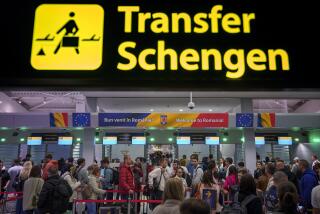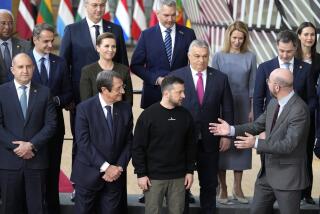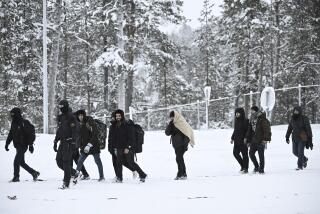The Latest: EU to boost controls at bloc’s external borders
The latest developments as European governments struggle to cope with the huge number of people moving across Europe. All times local:
02:05 a.m.
European Union leaders meeting in Brussels have agreed to beef up controls at the 28-nation bloc’s outer borders to stem the influx of migrants.
According to written conclusions released Thursday at the end of a seven-hour meeting, leaders pledge to “tackle the dramatic situation at our external borders and strengthen controls at those borders.”
To do that, they have promised more staff and equipment for the EU’s border and police agencies and the bloc’s asylum office.
___
01:15 a.m.
European Union leaders have agreed to give an extra 1 billion euros ($1.1 billion) to the United Nations refugee agency and World Food Program to help them offer food and shelter to people fleeing conflicts.
European Council President Donald Tusk said early Thursday the pledge was part of a range of actions agreed by the leaders who were meeting to discuss ways of tackling the overwhelming migration crisis.
Tusk, who chaired the meeting, said all 28 leaders “are absolutely sure that without regaining control of our external borders we have no chance to cope (with) this problem effectively.”
___
01:00 a.m.
The emergency European Union summit to discuss ways of tackling the migration crisis has ended.
Preben Aamann, spokesman for European Council President Donald Tusk, has tweeted that the meeting is over and Tusk will soon talk to the press to outline the conclusions.
No details were immediately available of what has been agreed.
Speaking before the meeting ended, Croatian Prime Minister Zoran Milanovic said he asked for “the utmost to be done in order to control the maritime routes between Turkey and Greece” that are used by many migrants fleeing to Europe.
___
12:45 a.m.
A European Union summit to discuss how the bloc can better tackle the migration crisis is continuing into the early hours of Thursday.
Preben Aamann, spokesman for European Council President Donald Tusk, has tweeted that the leaders are taking a short break from hours of talks to revise their final statement. It remains unclear when the meeting in Brussels will wrap up.
According to a draft text seen by The Associated Press, leaders are looking at long-term ways to tackle “the dramatic situation at our external borders and strengthen controls at those borders.”
Proposals under discussion include deploying more personnel to patrol EU borders, donating at least 1 billion euros ($1.1 billion) to international aid agencies to help refugees in camps near conflict zones like Syria and boosting support to Lebanon, Turkey and Jordan to help them cope with the millions fleeing the fighting in Syria.
___
6:50 p.m.
French President Francois Hollande is sending a blunt message to European Union countries that might refuse to respect an EU decision to share 120,000 refugees arriving in Greece and Italy.
Hollande said Wednesday that “those who don’t share our values, those who don’t even want to respect those principles, need to start asking themselves questions about their place in the European Union.”
His remarks came as he arrived for an EU summit in Brussels amid deep divisions between countries about how to handle Europe’s biggest refugee emergency in decades.
EU interior ministers agreed on Tuesday to distribute 120,000 refugees arriving in Greece and Italy over the next two years between other member states.
___
6:25 p.m.
European Union leaders will pledge to strengthen controls at the EU’s borders with the outside world to help tackle the refugee crisis, according to a draft statement seen Wednesday by The Associated Press.
The leaders want EU agencies to “tackle the dramatic situation at our external borders and strengthen controls at those borders.”
The draft text, which could be modified as their summit in Brussels evolves, calls on EU countries to provide more personnel and equipment to the bloc’s border and police agencies and asylum office.
They also call for more money to address the core reasons for people leaving their homes in Africa for Europe and funds to help countries like Turkey, Lebanon and Jordan deal with the Syrian refugee crisis.
___
6:20 p.m.
Italy’s youth hostels will shelter asylum-seekers as thousands of people fleeing war and persecution reach Italian shores after rescue from smugglers’ boats.
For now, hostels in seven cities will make available a total of 500 beds, while still keeping many beds for ordinary travelers in need of an economical place to sleep.
Organizers from Italian associations for hostels and for sports culture said in Rome Wednesday they devised the plan in hopes that hostel facilities like tennis courts and soccer fields will facilitate integration.
There is no age limit for the asylum-seekers at the hostels, although unaccompanied minors aren’t permitted. This week, Florence and Genoa hostels will welcome 70 and 50 asylum applicants respectively. Government officials select the asylum-seekers for the hostels.
___
6:15 p.m.
Hungary’s prime minister says a fence being built on the border with Croatia to stop migrants will be finished during the weekend.
Viktor Orban said Wednesday as he arrived in Brussels for a meeting of European Union national leaders that the fence would allow Hungary to enforce EU rules at the Croatian border about entering and traveling in the visa-free Schengen zone. Thousands of migrants a day have been entering from Croatia since Hungary finished a 4-meter (13-feet) -high fence along its border with Serbia last week.
Orban said that if EU leaders did not support enforcing Schengen rules, then Hungary “will set up a corridor through which the refugees or migrants can go to Austria or Germany.”
Nearly 240,000 migrants have come to Hungary this year, 35,000 of whom crossed over from Croatia recently, including 4,500 between midnight and 6 a.m. Wednesday.
Croatia is taking migrants to the border with Hungary, which then takes them by train and bus to the Austrian border, from where they continue their journey west.
Hungarian immigration officials said that since Friday not a single migrant entering from Croatia had requested asylum in Hungary.
___
4:05 p.m.
European Union President Donald Tusk says it is “critical” that European countries end their squabbling over migrants and agree on a concrete plan “in place of the arguments and the chaos we have witnessed.”
The hard fact, Tusk said, is that millions of potential refugees, not thousands, may try to reach Europe from the Middle East.
Tusk is hosting an emergency EU summit on the migrant crisis Wednesday evening. On Tuesday, EU ministers reached agreement on a resettlement plan for 120,000 asylum-seekers that was vehemently opposed by four of the bloc’s 28 members: Hungary, the Czech Republic, Slovakia and Romania.
Tusk called Tuesday’s decision “better than nothing,” but said his goal for the summit is forging a strategy for dealing with the migration crisis that all EU members will support.
___
4 p.m.
Austrian police are reporting a heavy flow of refugees and other migrants from Hungary, with about 5,000 people arriving at the main border crossing by mid-afternoon Wednesday.
That is more than all of Tuesday, when about 4,500 crossed into Austria at the Nickelsdorf crossing.
Also Wednesday, a law that allows the federal government to use its property to shelter migrants anywhere in the country has been passed in parliament.
The law is meant to allow the distribution of migrants and refugees even over objections from provincial governments that have refused to accept a quota system.
Only the populist, right-of-center Freedom Party, which generally opposes immigration, and one smaller populist party, voted against the measure.
___
2:20 p.m.
Serbia has given Croatia an ultimatum to reopen its border for all cargo transport by midnight, or face unspecified countermeasures.
Croatia shut all but one of its crossings with Serbia last week to block the migrant surge, which has reached 44,000 in a week. Croatia is angry that Serbia is busing migrants to its border, rather than sending them north to Hungary.
Croatia’s action has crippled the economy in Serbia, a conduit for cargo across Croatia to western and central Europe.
Serbian Prime Minister Aleksandar Vucic sent a protest letter to EU officials on Wednesday, saying “with aggressive and unacceptable measures, Croatia has drastically struck our national and vital economic interests as well as strongly undermining regional relations and stability.”
Croatia started letting trucks carrying food from Serbia across the border on Tuesday afternoon, but Serbian officials want all cargo traffic must be restored.
___
2:15 p.m.
Poland says it will accept some 7,000 refugees from Syria and Eritrea from 2016-2017.
The Interior Ministry says Poland is to take in some 5,000 people within the EU plan of relocation of asylum-seekers that was agreed on Tuesday. In addition, Poland will accommodate some 2,000 refugees that Warsaw committed to in July.
They will be gradually received in groups of 150 people in 2016 and 2017. Most will come from Italy and Greece, but some 900 will come from refugee camps in the Middle East.
___
1:55 p.m.
Hungary’s prime minister says wants the whole world to share the burden of housing refugees and migrants.
Viktor Orban has strongly opposed quotas for migrants within the European Union, but he said Wednesday that worldwide quotas would be among six proposals he will present to fellow EU leaders meeting in Brussels.
Orban said that “we should involve the whole world in the handling of this refugee crisis, migrant crisis, or as we Hungarians call it — people’s migration.”
Orban also repeated a suggestion for EU countries to help Greece protect its borders to prevent migrants flowing into the continent, saying member states could volunteer troops for such a mission.
___
1:40 p.m.
Turkey has begun enforcing long-dormant rules on Syrians’ travel within the country, in part over concerns about how the flow is affecting the country’s image.
According to a government document obtained by The Associated Press and interviews with officials and migrants, the moves so far appear to be ad hoc and aimed only at preventing migrants from reaching the Turkish frontier city of Edirne, where hundreds are staging a sit-in near the Greek border.
Ahmet Icduygu, who directs the Migration Research Center at Istanbul’s Koc University, says it’s a sign of a more determined effort by Turkey to get a handle on the country’s massive refugee population.
He says, “In the case of Syrians, this is the first time they are trying to be strict on movement. They’re clamping down.”
___
1:10 p.m.
The European Union’s executive arm is opening 40 new infringement cases against 19 member states for failing to implement the 28-nation bloc’s common asylum rules.
The announcement Wednesday came ahead of an emergency summit at which leaders will try to agree on coordinated policies to tackle the huge flow of migrants into Europe from conflict and poverty-torn nations in the Middle East, Africa and Asia.
The European Commission says that elements of the asylum policy not being implemented include legislation focused on speeding up asylum decisions, ensuring humane treatment of asylum-seekers and clarifying grounds for granting asylum.
European Commission First Vice President Frans Timmermans says, “Our common European asylum system can only function if everyone plays by the rules.”
Infringement notices have been sent to Austria, Belgium, Bulgaria, Cyprus, Czech Republic, Germany, Estonia, Greece, Spain, France, Hungary, Lithuania, Luxembourg, Latvia, Malta, Poland, Romania, Sweden and Slovenia.
___
12:40 p.m.
Slovakia’s prime minister says his country is challenging a European Union decision to redistribute 120,000 asylum seekers.
Besides the legal complaint at an EU court in Luxembourg, Robert Fico says his country is not ready to accept the plan to share the burden of migrants across the EU.
“We won’t implement this decision because we think it can’t work,” Fico told reporters Wednesday ahead of a meeting of EU leaders in Brussels.
Slovakia opposed the plan along with the Czech Republic, Romania and Hungary.
Fico says the quota system is “irrational.” He says his country “is not ready to respect it. We always rejected it as nonsense.”
___
12:10 p.m.
Czech Prime Minister Bohuslav Sobotka, who opposed the EU’s quota scheme to relocate 120,000 asylum-seekers in member states, says he won’t take legal action against the plan.
In an email message, Sobotka said Wednesday: “Even though I don’t like the use of the quotas, I don’t agree with them and we voted against them, Europe must not fall apart over solving the migrant crisis.”
He adds, “That’s why I don’t want to escalate the tension by challenge it with legal actions. There’re more battles ahead of us over a realistic approach to the migrant crisis and we need our partners in Europe to listen to our arguments.”
___
12:05 p.m.
Romania’s president says his country can easily cope with the extra migrants the European Union wants it to receive, but disagrees with the way the matter was decided.
President Klaus Iohannis said Wednesday that Romania would be asked to take about 2,400 extra on top of the 1,785 already agreed.
But Romania voted against the plan on Tuesday, along with Slovakia, Hungary and the Czech Republic.
Iohannis says “It is an unusual and inopportune thing that a vote was forced,” but he adds that “Romania is not against refugees, or receiving refugees.”
Quotas, he says do “take into account the realities of every state.”
___
11:55 a.m.
British Prime Minister David Cameron wants EU countries to deport more of the so-called economic migrants as the EU struggles to deal with a huge number of refugees arriving from the Middle East and Africa.
Cameron met French President Francois Hollande late Tuesday, and Cameron’s office says they “agreed that EU countries should do more to return migrants who don’t have a genuine claim for asylum to their countries of origin.”
They also urged more assistance to Syria’s neighbors, which have been overwhelmed by people displaced by the civil war.
EU ministers have agreed to distribute 120,000 migrants through a quota system, but Britain is not part of the bloc’s borderless “Schengen” area and has opted out of the plan.
Britain has pledged instead to accept 20,000 Syrians from camps in neighboring countries by 2020.
___
11:45 a.m.
An up-and-coming district in Berlin is considering confiscating empty apartments to house migrants.
On Wednesday, assembly members in the district of Friedrichshain-Kreuzberg will debate a proposal to seize several properties including parts of Riehmers Hofgarten, an ornate bloc of houses from the late 19th century.
The proposal was put forward by the Green Party, which has 22 of the 49 seats in the assembly. Property owners would receive compensation for the use of their property.
German cities are struggling to house hundreds of thousands of migrants who have come to the country this year seeking to escape war, persecution and poverty.
___
11:40 a.m.
Deeply divided European Union leaders have been called to an emergency summit to seek long-term responses to the continent’s ballooning crisis of refugees and migrants, a historic challenge EU President Donald Tusk said the bloc has failed dismally to meet.
In a letter to presidents and prime ministers of member states, Tusk writes: “There is a long list of issues where we could blame one another, but it will not help us in finding a common solution.”
He adds: “Today we must absolutely work out policies that we can implement in order to help each other.”
___
11:30 a.m.
Slovak media used strong words to express bitter feelings after European Union interior ministers approved a plan to relocate 120,000 asylum-seekers .
Slovakia opposed the plan along with the Czech Republic, Romania and Hungary.
A headline in Hospodarske Noviny, a business daily said Wednesday: “The Germans won a blitzkrieg,” adding “they took the rest of our sovereignty.”
The daily Pravda’s front page said: “Slovakia suffered a loss in its fight against the quotas.”
___
10:35 a.m.
The European Union hopes to provide more than 1 billion euros ($1.1 billion) in aid to Syrian refugees and release another 1 billion euros for Turkey, the host for almost 2 million people who have fled the conflict.
The EU’s executive Commission plans to allocate more than 300 million euros to top up its “trust fund” for Syrian refugees.
Johannes Hahn, the commissioner responsible for ties with the EU’s neighbors, said Wednesday that “this is a signal and hopefully will stimulate our member states to do the same,” and push the total to 1 billion euros.
He also says the Commission is working with Turkey to free up 1 billion euros earmarked for that country’s EU membership process as a short-term measure to help deal with the refugee influx.
___
10:10 a.m.
Austrian police say that about 2,500 migrants and refugees have arrived at the main border point between Austria and Hungary, a day after 5,000 crossed into Austria.
Police spokesman Helmut Marban says the new arrivals were bused to the Hungarian side of the Nickelsdorf crossing point early Wednesday. From there they are walking into Austria.
Copyright 2015 The Associated Press. All rights reserved. This material may not be published, broadcast, rewritten or redistributed.
More to Read
Start your day right
Sign up for Essential California for news, features and recommendations from the L.A. Times and beyond in your inbox six days a week.
You may occasionally receive promotional content from the Los Angeles Times.






